SHARING... THE PATH TO PEACE
A Muslim Filipina's journey towards peace through Silsilah, a movement for Muslim-Christian dialogue in the Philippines
Summer 2005
Return to Table of Contents
Print Article
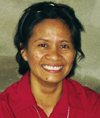
"There is a need for me to ask forgiveness today for everything my ancestors have done against our Muslim brothers and sisters. Being open to dialogue, I believe, could tear down all barriers between us and help to create a path to peace."
Sr. Lalang (Lorie) Nuñez
The following is an excerpt from a recent conversation between Amina Mambuay and Our Lady's Missionary Sr. Lalang (Lorie) Nuñez. Amina Mambuay is the coordinator of the Cagayan de Oro branch of Silsilah, a movement for Muslim-Christian Dialogue based in Zamboanga City in Southern Mindanao, Philippines. The movement aims to break down barriers between religions with an awareness of the Spirituality of Dialogue. Silsilah – an Arabic word meaning "chain" or "link" – envisions a life in dialogue for Muslims, Christians and people of other faith traditions. It is a dialogue built on respect, trust and love for one another, moving together towards a common experience of harmony, solidarity and peace. Visit Silsilah at www.silsilahforum.org
The island of Mindanao is located in the Southern Philippines. There was a time when the vast majority of its inhabitants were Tribal and Muslim peoples. Then in the 1950s, Mindanao was labeled "The Land of Promise" by the Philippine government and people were encouraged to migrate there. They were given huge tracts of land that were until then untitled – untitled because neither the Tribal people nor the Muslims realized that without such papers, their ancestral domain would be given away.
Today, a few parts of Mindanao still have a Muslim and Tribal majority. Most parts, however, now have a Christian majority and the Tribal and Muslim people have become minorities in their own land.
Our Lady's Missionaries Srs. Lalang Nuñez and Yolanda Cadavos (both Filipinas), and Christine Gebel live in the predominantly Christian city of Cagayan de Oro on the island of Mindanao. They are members of Silsilah.
Sr. Lorie: I am so happy that we've come together today so that I can hear your story as a Muslim woman in Mindanao. Where would you like to start?
Amina: Well, I was born and raised in Marawi City, a Muslim area about 125 kilometres from Cagayan de Oro, but it may as well have been in another world. In those days, the roads were terrible, but it was also a matter of safety. The nearest city was Iligan, 30 kilometres away, which was predominantly Christian. The stretches of empty road between Marawi and Iligan were prone to hold-ups, ambushes and kidnappings. It was risky for Christians from Iligan to come to our area, and it was also unsafe for us to travel to Iligan City. I was in high school before I visited Iligan for the first time.
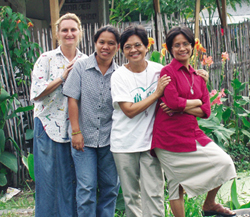
Sr. Christine Gebel, Anie Montejo who is discerning her vocation as an Our Lady's Missionary, Sr. Yolanda Cadavos and Sr. Lalang Nuñez
Can you tell me about your family?
We are Maranao Muslims and can trace our lineage to the Sultan of Marinaut. My father died when I was three years old, leaving my mother with three children to care for. She had to work outside the home and went back to school to get her Masters Degree in Education. We children spent most of our time with our mother's parents.
How did these experiences affect you?
My grandparents' generation had had many bad experiences with American soldiers during the war and then with American missionaries. From my grandparents, I learned to call Christians "kafir" (infidel), and I learned to fear Christians. We were told not to go near the church because the priest would steal us away.
Sad to say, as children we were told the same thing about Muslims. And yet, you were courageous enough to leave the security of Marawi?
When I finished high school, I decided to go to college at Mindanao State University. At first, I was afraid to leave my home and try to find my way in a Christian world. But then my mother, who had gone to college outside Marawi, encouraged me to do the same. She wanted me to have a wider vision of the world. I spent my first year in a Christian college in Dumaguete City on the island of Negros in central Philippines. I was the only Muslim there.
Being a Christian school, they were not sensitive to my dietary and faith needs as a Muslim. When it was the turn of my student residence to sponsor the Sunday service at the church, I was forced to attend the service, to make an offering and to do a reading.
After the first year, I moved to Cagayan de Oro to complete my studies at Xavier University. At first it was not easy to find a place to live. Every boarding house I visited told me that they did not have a room available. With my cousin's advice I renewed my search, but no longer stated that I was from Marawi, which revealed that I was a Muslim. As well, my cousin's Christian friend accompanied me and I finally found a place.
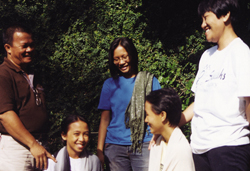
Amina Mambuay with her husband, Nathaniel and their three daughters Lara Angeli, Sarah Adrianne, and Farrah Asleigh.
What were your experiences as a Muslim woman in a Catholic University?
I often felt invisible, unrecognized, but I had some good experiences, too. Just before my graduation, one of my professors, a Jesuit priest, noticed that with my grades I should have been on the honour roll. He wrote a letter to the Dean on my behalf. However, the Dean replied that I could not be put on the honour roll because I was a "transferee," having transferred from another college.
What did you do after you graduated?
I worked at the Peace Centre at Xavier University. At that time the focus of peace work was on research and conflict resolution. I spent my time interviewing indigenous people and Muslims, often about land issues. It was then that I first learned about Silsilah when the Peace Centre sent me there for a one-week training session on conflict resolution.
Is that when you got married?
Yes, and we now have three daughters. Unfortunately, we have had problems finding work and housing, as there are parts of Cagayan de Oro where Muslims are not welcome to live or work.
You've been through so much. What keeps you going?
There is so much work to be done. We live in a world where "Muslim" equals "terrorist." I don't think we will reach true peace in my lifetime, but I hope that my children will experience it. And as long as I live, I will work for peace.
How do you define peace?
I realize now that peace must include spirituality – a spirituality of dialogue. Before, I didn't have a very deep understanding of my own faith, and I was impatient with the process of reflection and sharing. Now, I understand that I must first be deeply rooted in my own faith. Only then am I free to reach out to people of other faiths without the fear and suspicion that they may be trying to convert me.
Sincerity is the key. Together, we need to understand and appreciate the commonalities of our faith traditions rather than the differences.
I know I have to start with myself, reflecting more deeply so as to understand myself better. After supper each night, my family sits around the table and we share our feelings and about our day. This has made a big difference for us. My children mentioned our dinnertime routine to their classmates and one of the parents, a neighbour, came to ask me about this practice. I believe that sharing our stories is the way to peace.
If we can break down the walls of fear, insecurity and prejudice between us, we can begin to meet not just Muslim to Christian, but person to person, and child of God to child of God.
This is the path to peace. Insha Allah! (God willing!)
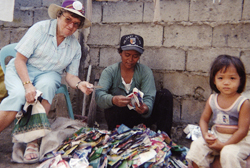
Sr. Mary Gauthier with a local vendor and her daughter. Cagayan de Oro, Philippines.
"After spending nine years in Canada – eight years as a member of Our Lady's Missionaries Leadership Team and one year of study – I am once again being immersed into the life, culture and language of the Filipino people and the Earth community. I am discovering that my ministry for the next year will be one of listening and watching. Listening to the stories of the people and watching a sunset reveal for me the marvel of God's creation. This awakens in me the Spirit of Sophia, a compassionate loving God."
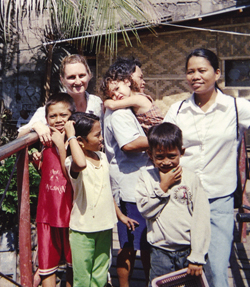
Sr. Christine Gebel, Curding and Anie Montejo with neighbourhood children. Anie is currently discerning her vocation as a novice with Our Lady's Missionaries. Bitan-ag Village, Cagayan de Oro, Philippines.
Sr. Christine writes: "I see my ministry as accompaniment of the people of our parish and of the young women who come to us discerning a vocation to religious life. As I accompany, I hope I can also be helping others to begin the first step on the path to peace as Amina describes it (see page 14): growing in self-awareness and in one's faith so as to be able to reach out to others in freedom, without fear and suspicion."
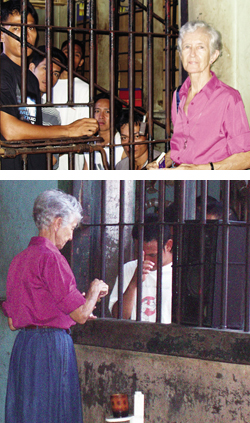
In her prison ministry, Sr. Myra Trainor visits prisoners, advocates on their behalf and joins in their celebration of mass.
"During the Mindanao Week of Peace I was touched by the similarity between the stories of prejudice confessed by both Christian and Muslim speakers. These truthful and hurtful stories have been unconsciously passed on from generation to generation. Now as I listen to the prisoners from various minority backgrounds, I am more aware and better understand some of their suffering. I hope this awareness will help to break the chains within me and contribute in some small way to bringing understanding and harmony to the world around us."
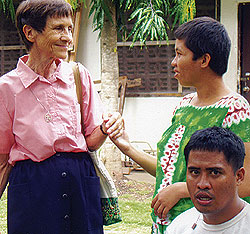
Sr. Margaret Walsh with friends and neighbours. Cagayan de Oro.
"Because of the experience and knowledge of violence in our world, here in the Philippines and especially on our island of Mindanao where we live, many people feel a deep longing for peace and a desire to be peacemakers. In my pastoral ministry this desire is expressed by adults in their prayer and study groups, by students who work for peace, and by the sick for whom peace is manifested in the love and care they receive from others. As I listen to these longings I am deeply touched and my own desire to be a peacemaker is enkindled."
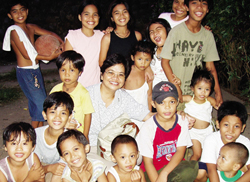
Sr. Yolanda Cadavos with the children's prayer group of Bitan-ag Village, Cagayan de Oro City.
"In a recent Muslim-Christian gathering in Marawi City I was profoundly touched by the sharing of stories and then the sharing of food. This experience opened my eyes to see that it is possible to truly live and work for peace if one is willing to listen with respect and in friendship. Yes, there are signs of hope, slivers of light in the often hazy reality here in Mindanao."
Return to Table of Contents
Print Article